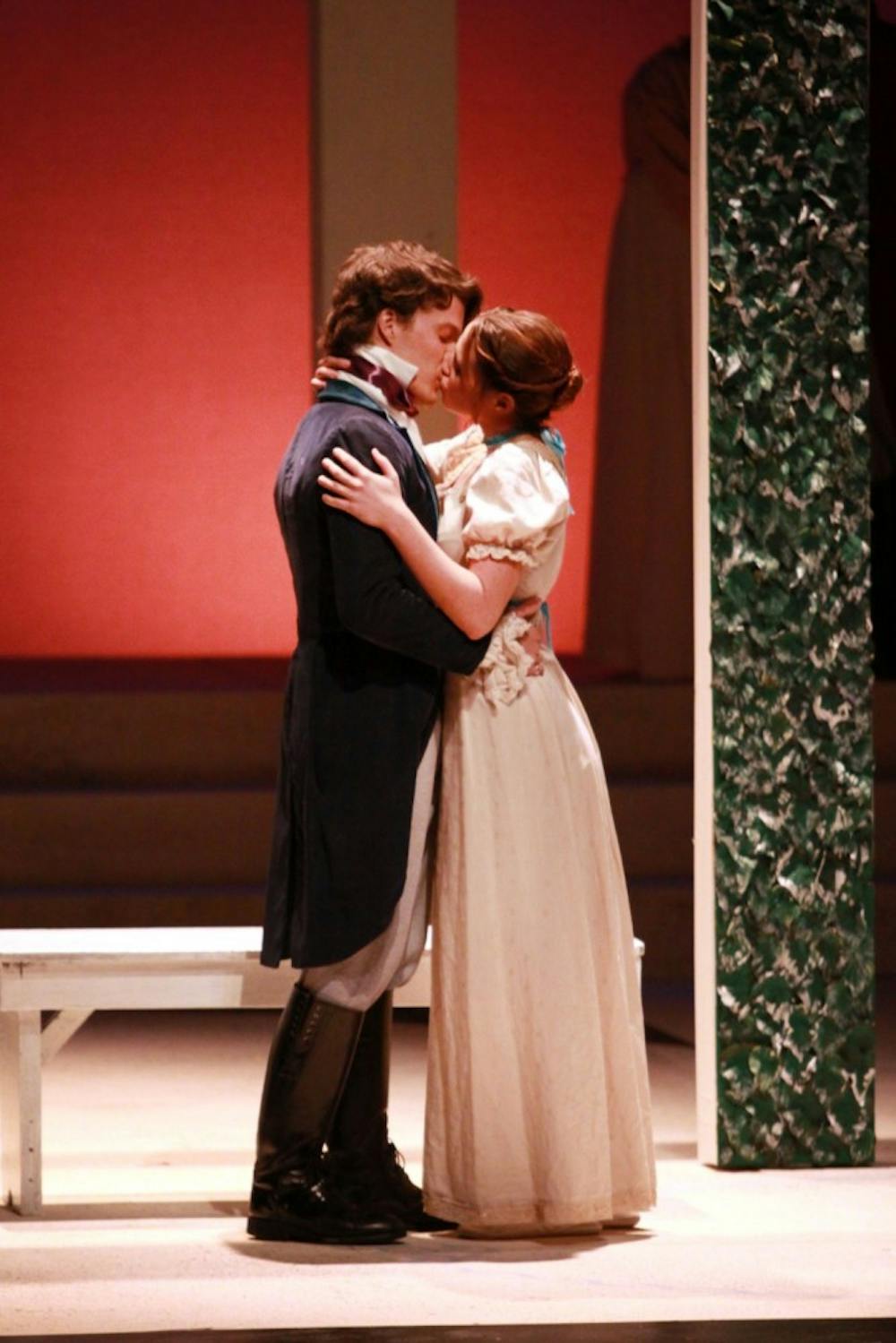[box]Video by Morgan Mayer, Multimedia Reporter.[/box]
The stage had transformed into 1813 Hertfordshire, complete with bonneted women, lilting English dialects and male servants donning high heels. It was as though a scene had been lifted straight out of Jane Austen’s most famous novel. But in reality, Elon University’s Department of Performing Arts had constructed a theatrical interpretation of Austen’s “Pride and Prejudice,” performed April 19-22 in McCrary Theatre.
From the dialects to the props, the production harkened well to the novel’s narrative. The cast and crew insisted on being absolutely accurate on character posture, costume design and Austen’s intent when she first wrote the novel almost 200 years ago. But Elon’s production of “Pride and Prejudice” didn’t strike as a mere copycat of the novel. It was able to become something incredible of its own.
For one, the wit and comedy found in Austen’s novel was highlighted and emphasized more than most would gather from reading her text. Although one of the strengths of “Pride and Prejudice” is its humor, the actors in Elon’s production truly embraced their characters and brought out an exaggeration not vividly seen when reading the book.
But in characters such as Mrs. Bennet, played by junior Claire Manship, or Mr. Collins, played by junior Carl St. Goar, the show was humorous all the way through. Manship’s accurate portrayal of the often ridiculous, smothering and overwhelming Mrs. Bennet kept audiences entertained, even when she was not the forefront of the attention. Her exaggerated laughs and shouts for her husband or daughters were everything the notorious Mrs. Bennet should be and highlighted exactly what Austen intended in her creation of Mrs. Bennet: satirizing women who thought of nothing but marrying daughters off quickly and into good names and fortunes.
St. Goar’s interpretation of Mr. Collins was spot on as well. In adaptations over time, Mr. Collins’ character has been treated in many different ways. He has been played as nervous, stammering and awkward, but he has also been characterized as serious and emotionless. But St. Goar breathed new life into Mr. Collins by making him quirky in a subdued, almost intractable manner. In fact, if the audience wasn’t watching St. Goar’s facial expressions and body language, it might have been missed. But the subtlety brought to the role made it all the more humorous and engaging, and also underscored Mr. Collins’ upright, pompous manner perfectly.
Of course, the lead characters of Elizabeth Bennet and Mr. Darcy, played by senior Stephanie Lloyd and junior Logan T. Sutton, were well-played and brought a new appreciation for the timeless characters. Lloyd’s Elizabeth was engaging and charming yet always prudent, whereas Sutton’s portrayal of Darcy was aloof and solemn but eventually won over the audience. The cheers that came from the audience during the final proposal scene were a testament to how Lloyd and Sutton connected to their respective characters and made them the relatable individuals so many have loved for generations.
The set was minimalist and changed very subtly throughout the play. But the choice to remain minimalist suited Elon’s production perfectly and emphasized, rather than took away from, the dialogue and actors. The costume design was superb and took audiences back to early 1800s England, from the fashionable headwear donned to the traveling cloaks worn.
Elon’s production of “Pride and Prejudice” was a delight for all ages and genders. While staying true to Austen’s text, it also became something unique from both the novel and previous adaptations of “Pride and Prejudice.” It was an evening at the theater Mr. Bingley himself would have declared “top of the hill.”


